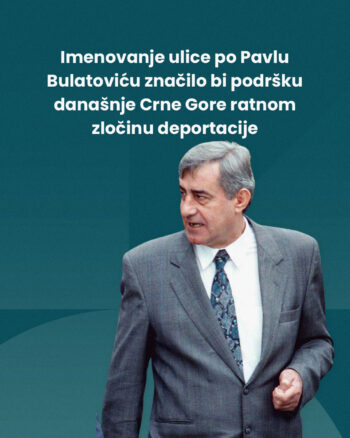Civil society organizations strongly oppose the possibility that a street in the Capital city of Podgorica be named after Pavle Bulatović, a man directly responsible for the war crime of deporting Bosnian refugees. We regret that our previous arguments against this initiative, raised already last year, have not been taken into account.
We warn that adopting this decision would send a dangerous message: that war crimes remain politically acceptable. Such a move would undermine the rule of law, erode public trust in institutions. That approach is insulting victims, deepening societal divisions, hindering reconciliation, and destroying efforts to build a society grounded in justice and truth. Instead of promoting a culture of remembrance through street naming, this initiative legitimizes a war-torn past and the ideology that left behind widespread suffering and atrocities.
We remind that on 29 July 2025, members of the Council for Naming Settlements, Streets, and Squares of the Capital City approved the proposal submitted by Democratic Party councillors Mitar Vuković and Vladimir Čađenović to name a street in Podgorica after Pavle Bulatović, former Minister of Internal Affairs of Montenegro and Minister of Defence of the Federal Republic of Yugoslavia.
Vuković and Čađenović originally submitted this proposal on 27 October 2023, but it was postponed pending the opinion of the Ministry of Culture and Media. The Ministry responded that it had no legal basis to take a position at the time, as the Council had not yet adopted the proposal, and the initiative was returned. Moreover, 23 NGOs last year urged the leader of Democratic Montenegro, Aleksa Bečić, to ensure that his party’s councillors withdraw the proposal, but he never responded.

The proposal was approved with the votes of Council members from the ruling parties (Democratic Party, Movement for Podgorica – PzPG, and United Montenegro), with one vote against from Miloš Đuričković of the European Alliance.
Meanwhile, Đuričković has since resigned from the Council in protest against this decision, stating that the decision conflicts with his “moral and value convictions, as well as with the truth about the events of that period.”
We recall that in 1992, while serving as Montenegro’s Minister of Internal Affairs, Pavle Bulatović directly ordered the unlawful deportation of Bosnian refugees. Acting on his instructions, Montenegrin police detained and handed over at least 66 civilians to the armed forces of the Bosnian Serb Republic, of whom only 12 survived, according to official documents (Judgment Ks. 6/12, 22.11.2012, www.sudovi.me, p. 120). These are not speculations, but judicially established facts. The fact that Bulatović was never convicted due to his assassination in 2000 does not absolve him of responsibility and certainly does not justify glorifying him today.
Beyond his role in the Deportation case, while serving as Minister of Defence of the FRY (1993–2000), units of the Yugoslav Army committed mass war crimes in Bosnia and Herzegovina, Croatia, and Kosovo. Graham Blewitt, Deputy Chief Prosecutor of the ICTY, stated that “the assassinated Yugoslav Defence Minister Pavle Bulatović was under investigation, and not only for events in Kosovo.”
With this decision to honour Pavle Bulatović with a street in the capital of Montenegro, city authorities have deeply offended the families of victims, many of whom are still searching for the remains of their loved ones, as well as all Montenegrin citizens who believe in justice and human rights. This is an act of institutional revisionism that undermines efforts to build reconciliation and uphold the rule of law.
What is especially concerning is that councillors from parties that present themselves as civic-oriented supported this proposal, while simultaneously participating in the rehabilitation of figures from the wartime past. This demonstrates that denial of crimes and glorification of the past remain embedded in their political agendas.
It is now up to the Ministry of Culture and Media, which under the Law on Memorials is obliged to assess whether Pavle Bulatović qualifies as a “distinguished individual” (Article 5). Furthermore, Article 10 explicitly prohibits memorials to individuals who played a negative role in the history of Montenegro or humanity.
It is indisputable that Pavle Bulatović does not meet the legal criteria for a distinguished individual. We therefore urge the Ministry to reject this proposal without delay. We also warn that the rehabilitation of individuals responsible for crimes is extremely dangerous and has already been flagged by the European Parliament in its 2025 Resolution on Montenegro. If the state allows such practices, it signals that crimes may be rewarded, and accountability diminished. This undermines justice, dishonours victims, and fosters a society where violence and impunity are normalized.
Human Rights Action
Association Spektra
Centre for Civic Education (CCE)
Centre for Civic Liberties (CEGAS)
Centre for Democracy and Human Rights (CEDEM)
Centre for Investigative Journalism (CIN CG)
Centre for Monitoring and Research (CeMI)
Centre for Development of NGOs (CRNVO)
Centre for Women’s and Peace Education ANIMA
Women’s Rights Centre (WRC)
Montenegrin LGBTIQ Association Queer Montenegro
Montenegrin PEN Centre
Montenegrin Women’s Lobby
Montenegrin Philological Society
Association of Montenegrin Publishers
Institute for Socio-Political Research Analitico
Montenegrin Media Institute
Juventas
PRIMA
Safe Women’s House
STEGA
Association of Youth with Disabilities of Montenegro (UMHCG)
Association “Štrpci – Against Oblivion”
Association of Lawyers of Montenegro
Alen Bajrović, civic activist
Dina Bajramspahić, civic activist
Jovana Marović, civic activist
